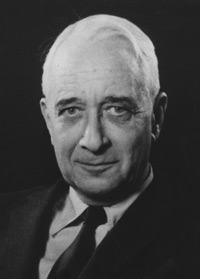Difference between revisions of "Lionel Trilling"
Absentminded (talk | contribs) |
|||
| (8 intermediate revisions by 2 users not shown) | |||
| Line 3: | Line 3: | ||
{{wp-also}} | {{wp-also}} | ||
| − | '''Lionel Trilling''' [[Columbia College|CC]] '[[1925|25]] [[MA]] '[[ | + | '''Lionel Trilling''' [[Columbia College|CC]] '[[1925|25]] [[MA]] '[[1926|26]] [[PhD]] '[[1938|38]] was a famous literary critic and a [[University Professor]]. |
| + | |||
| + | With only brief interruptions, he spent almost his entire postcollegiate career at Columbia. His dissertation, which took him eleven years to write, was on [[w:Matthew Arnold|Matthew Arnold]]. In [[1939]], Trilling was the first Jewish professor in the [[English Department]] to obtain tenure. He was elevated to a full professorship in [[1948]]. In [[1965]], he received the title [[George Edward Woodberry]] Professor of Literature and Criticism. | ||
Among other achievements, Trilling was instrumental in the development of the [[Core Curriculum|Core]]. With [[Jacques Barzun]], he co-taught a precursor to Core classes known as the [[Colloquium on Important Books]], and was later a frequent instructor in the proto-[[Lit Hum]] class known as [[Humanities A]]. | Among other achievements, Trilling was instrumental in the development of the [[Core Curriculum|Core]]. With [[Jacques Barzun]], he co-taught a precursor to Core classes known as the [[Colloquium on Important Books]], and was later a frequent instructor in the proto-[[Lit Hum]] class known as [[Humanities A]]. | ||
| − | Trilling was | + | Older alumni, many of whom came to Columbia to "take Trilling," look back on his presence fondly. Trilling was a mentor, for example, to a young [[Norman Podhoretz]]. Also among his students were [[Jack Kerouac]], [[Allen Ginsberg]], [[John Hollander]], and [[Louis Menand]]. |
| − | + | Although a prominent liberal (he authored ''The Liberal Imagination''), Trilling was criticized later in life for not being able to understand or connect with the youth movements that engendered cataclysms such as the [[1968 protests]]. | |
Trilling was a recipient of the [[Mark Van Doren Award]]. The [[Lionel Trilling Book Award]] and the [[Lionel Trilling Seminars]] were both established in his memory in [[1976]], the year following his death. | Trilling was a recipient of the [[Mark Van Doren Award]]. The [[Lionel Trilling Book Award]] and the [[Lionel Trilling Seminars]] were both established in his memory in [[1976]], the year following his death. | ||
| + | |||
| + | In [[2008]], scholars unearthed an unfinished novel of Trilling's in the Columbia archives. | ||
| + | |||
| + | His office was located at 205 [[Hamilton Hall]], right next to [[Mark Van Doren]]'s. His apartment was in [[620 W. 116th St.]], now a [[Barnard College|Barnard]] dorm. | ||
==External links== | ==External links== | ||
*[http://www.college.columbia.edu/core/oasis/profiles/trilling.php Columbia College profile of Trilling] | *[http://www.college.columbia.edu/core/oasis/profiles/trilling.php Columbia College profile of Trilling] | ||
*[http://www.columbia.edu/cu/alumni/Magazine/Spring2006/podhoretz.html Columbia Magazine article on the Trilling-Podhoretz correspondence] | *[http://www.columbia.edu/cu/alumni/Magazine/Spring2006/podhoretz.html Columbia Magazine article on the Trilling-Podhoretz correspondence] | ||
| + | *[http://www.columbia.edu/cu/lweb/archival/collections/ldpd_4079615/index.html Lionel Trilling Papers at the Columbia University Library] | ||
[[Category:Former professors|Trilling, Lionel]] | [[Category:Former professors|Trilling, Lionel]] | ||
| + | [[Category:English professors|Trilling, Lionel]] | ||
[[Category:Columbia College alumni|Trilling, Lionel]] | [[Category:Columbia College alumni|Trilling, Lionel]] | ||
[[Category:GSAS alumni|Trilling, Lionel]] | [[Category:GSAS alumni|Trilling, Lionel]] | ||
| − | [[Category:Van Doren Award recipients|Trilling]] | + | [[Category:Van Doren Award recipients|Trilling, Lionel]] |
| + | [[Category:Class of 1925|Trilling, Lionel]] | ||
| + | [[Category:Great Teacher Award recipients]] | ||
Latest revision as of 17:02, 24 May 2013
Lionel Trilling CC '25 MA '26 PhD '38 was a famous literary critic and a University Professor.
With only brief interruptions, he spent almost his entire postcollegiate career at Columbia. His dissertation, which took him eleven years to write, was on Matthew Arnold. In 1939, Trilling was the first Jewish professor in the English Department to obtain tenure. He was elevated to a full professorship in 1948. In 1965, he received the title George Edward Woodberry Professor of Literature and Criticism.
Among other achievements, Trilling was instrumental in the development of the Core. With Jacques Barzun, he co-taught a precursor to Core classes known as the Colloquium on Important Books, and was later a frequent instructor in the proto-Lit Hum class known as Humanities A.
Older alumni, many of whom came to Columbia to "take Trilling," look back on his presence fondly. Trilling was a mentor, for example, to a young Norman Podhoretz. Also among his students were Jack Kerouac, Allen Ginsberg, John Hollander, and Louis Menand.
Although a prominent liberal (he authored The Liberal Imagination), Trilling was criticized later in life for not being able to understand or connect with the youth movements that engendered cataclysms such as the 1968 protests.
Trilling was a recipient of the Mark Van Doren Award. The Lionel Trilling Book Award and the Lionel Trilling Seminars were both established in his memory in 1976, the year following his death.
In 2008, scholars unearthed an unfinished novel of Trilling's in the Columbia archives.
His office was located at 205 Hamilton Hall, right next to Mark Van Doren's. His apartment was in 620 W. 116th St., now a Barnard dorm.
